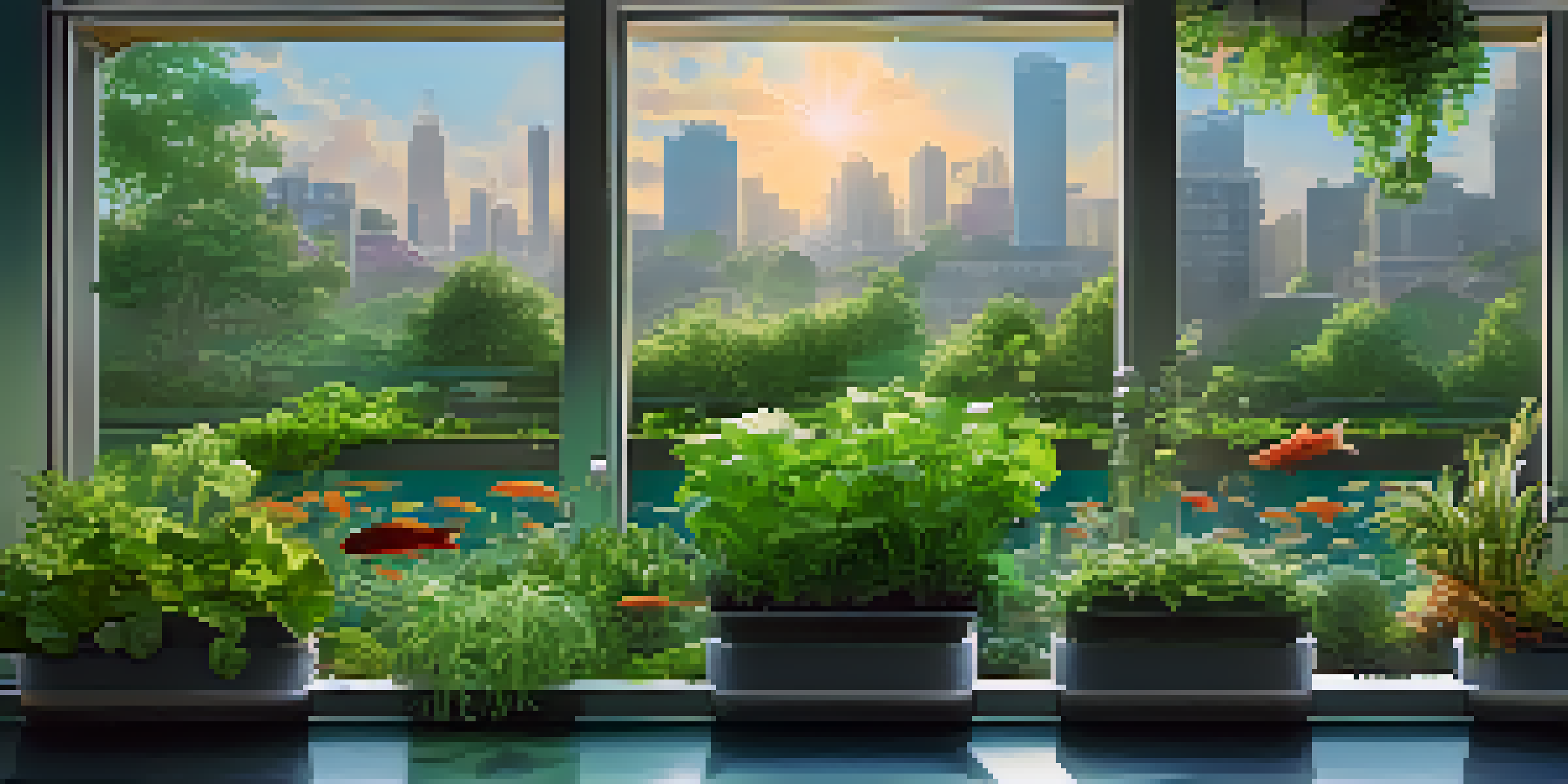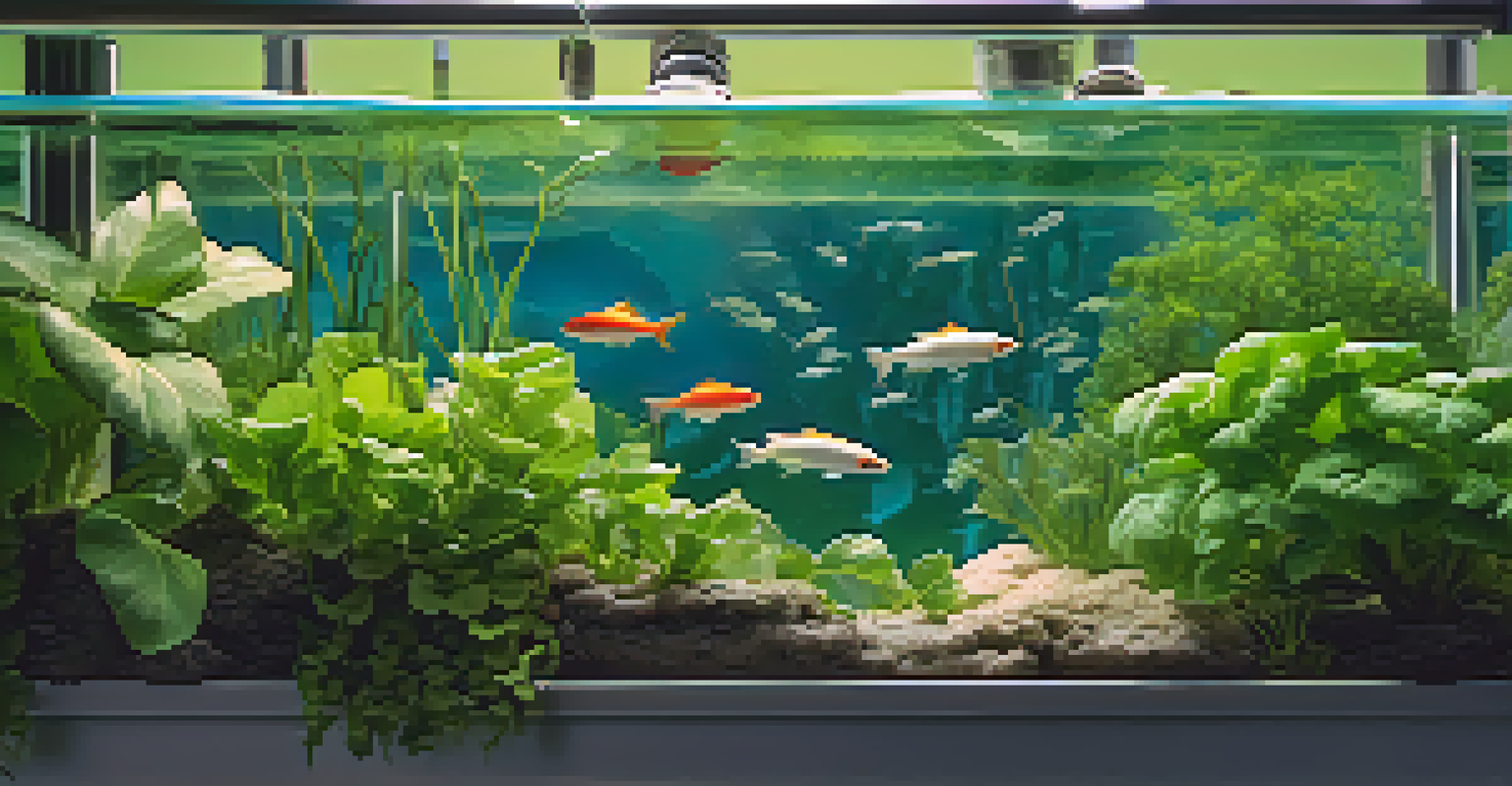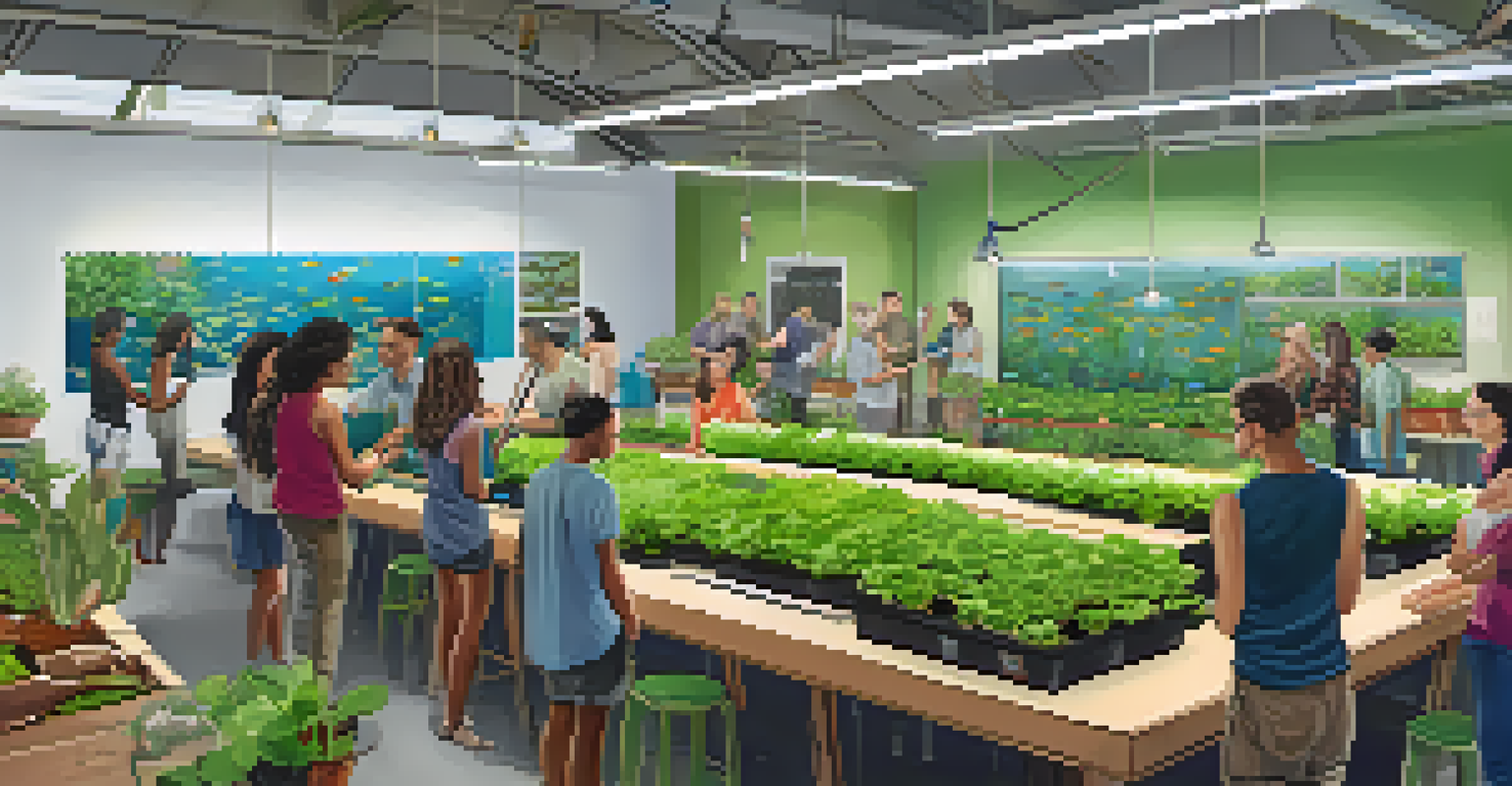Aquaponics: A Sustainable Farming Method in Honolulu

What is Aquaponics and How Does it Work?
Aquaponics is a combination of aquaculture and hydroponics, creating a symbiotic environment where fish and plants grow together. In this system, fish waste provides organic nutrients for the plants, while the plants filter the water for the fish. This closed-loop system minimizes waste and maximizes efficiency, making it an ideal solution for urban farming.
The future of food is not about the amount we produce, but the way we produce it.
Imagine a miniature ecosystem where fish and plants support each other—this is the essence of aquaponics. By using this method, farmers can produce fresh vegetables and fish without the need for chemical fertilizers or pesticides. It’s a sustainable farming practice that thrives even in limited spaces, making it perfect for cities like Honolulu.
In essence, aquaponics is about working with nature rather than against it. This innovative approach not only provides food but also conserves water and reduces the carbon footprint associated with traditional farming methods. It’s a win-win for the environment and for those seeking fresh, local produce.
The Benefits of Aquaponics in Urban Areas
Aquaponics offers a myriad of benefits, especially in urban settings like Honolulu, where space is often limited. One of the most significant advantages is its ability to produce food in areas where traditional farming may not be feasible. This means that fresh fish and vegetables can be grown right in the heart of the city, reducing transportation costs and carbon emissions.

Moreover, aquaponics systems use about 90% less water than conventional farming methods, making them incredibly resource-efficient. This is particularly important in places where water scarcity is a concern. By adopting aquaponics, urban farmers can contribute to a more sustainable food system while preserving valuable natural resources.
Aquaponics: A Sustainable Solution
Aquaponics combines fish farming and plant cultivation in a closed-loop system, promoting sustainability and resource efficiency.
Additionally, aquaponics promotes biodiversity by allowing a variety of plants and fish to coexist. This diversity not only supports a healthier ecosystem but also creates a more resilient food supply. As cities grow and face challenges like climate change and population density, aquaponics stands out as a practical solution.
Aquaponics in Honolulu: A Growing Trend
In Honolulu, aquaponics is gaining traction as a sustainable farming method that aligns with the island's commitment to environmental stewardship. Local farmers and community groups are increasingly recognizing its potential to provide fresh food while reducing reliance on imported goods. This trend reflects a growing awareness of the importance of food security and sustainability.
Sustainability is about ecology, economy, and equity.
Several initiatives and workshops have sprung up around the island, aimed at educating residents about aquaponics. These programs not only teach the basics of setting up an aquaponics system but also emphasize the environmental benefits of this farming method. As more people become aware of aquaponics, interest and participation in local food production continue to rise.
The integration of aquaponics into Honolulu's food landscape is a testament to the community's innovative spirit. As more urban farmers adopt this method, it contributes to a healthier, more sustainable future for the island. By embracing aquaponics, Honolulu is setting an example for other cities looking to enhance their food systems.
Challenges Facing Aquaponics in Honolulu
While aquaponics presents numerous benefits, it does come with its own set of challenges. One significant hurdle is the initial setup cost, which can be a barrier for many aspiring farmers. Building a system that effectively balances the needs of both fish and plants requires investment in equipment and infrastructure, which might deter some from entering the field.
Additionally, maintaining the delicate balance between fish and plant health can be tricky. It requires a good understanding of both aquaculture and horticulture, which may not be familiar to all growers. Without proper knowledge and ongoing management, systems can quickly become unbalanced, leading to poor yields or fish deaths.
Urban Farming Benefits in Honolulu
Aquaponics allows for local food production in urban areas, drastically reducing transportation costs and water usage.
Lastly, there is a need for more research and data specific to aquaponics in Hawaii's unique climate. Local conditions can significantly affect the success of aquaponic systems, and tailored guidelines would help farmers navigate these challenges. Addressing these issues will be crucial for the broader adoption of aquaponics in Honolulu.
Local Success Stories in Aquaponics
Several local farms in Honolulu have successfully embraced aquaponics, showcasing its potential for sustainable food production. For instance, a community farm in Kaka'ako has implemented an aquaponics system that produces a variety of leafy greens and fish, providing fresh food to local markets. Their success has inspired others to consider aquaponics as a viable farming option.
These success stories highlight the adaptability of aquaponics to Hawaii's unique environment. By utilizing native fish species and local plant varieties, these farmers optimize their systems for both productivity and sustainability. Their experiences serve as valuable examples for others looking to enter the aquaponics field.
Moreover, these farms often engage with the community through workshops and educational programs, fostering a culture of learning and sharing. By showcasing their systems and sharing knowledge, they help demystify aquaponics and encourage more people to explore this innovative farming method.
Integrating Aquaponics into Local Education
As aquaponics gains popularity, integrating it into local education systems is becoming increasingly important. Schools and universities in Honolulu are beginning to recognize the value of hands-on learning experiences that aquaponics provides. By incorporating aquaponics into science and agriculture curricula, students can learn about sustainable practices while engaging in real-world applications.
Programs that involve students in building and maintaining aquaponics systems promote critical thinking and problem-solving skills. Students not only learn about biology and ecology but also gain a deeper understanding of where their food comes from. This experiential learning can inspire the next generation of environmentally-conscious citizens and potential farmers.
Challenges to Aquaponics Adoption
Initial setup costs, knowledge gaps, and the need for localized research pose challenges for the widespread adoption of aquaponics in Honolulu.
Furthermore, partnerships between educational institutions and local aquaponics farms can enhance community engagement. By collaborating on projects and sharing resources, schools can help bridge the gap between education and practical application. This synergy fosters a culture of sustainability that extends beyond the classroom.
The Future of Aquaponics in Honolulu
The future of aquaponics in Honolulu is bright, with the potential to reshape local food systems and promote sustainability. As more residents and farmers adopt this method, we can expect to see an increase in local food production, which will reduce dependence on imported goods. This shift not only enhances food security but also supports the local economy.
Technological advancements in aquaponics are also on the horizon. Innovations such as automated monitoring systems and energy-efficient designs are making it easier for farmers to manage their operations. These developments will likely improve yields and reduce costs, making aquaponics more accessible to a broader audience.

Ultimately, the growth of aquaponics in Honolulu represents a shift toward more sustainable practices in agriculture. As the community embraces this innovative farming method, it sets a powerful example for other regions facing similar challenges. With continued support and education, aquaponics can play a pivotal role in creating a healthier, more sustainable future for the island.